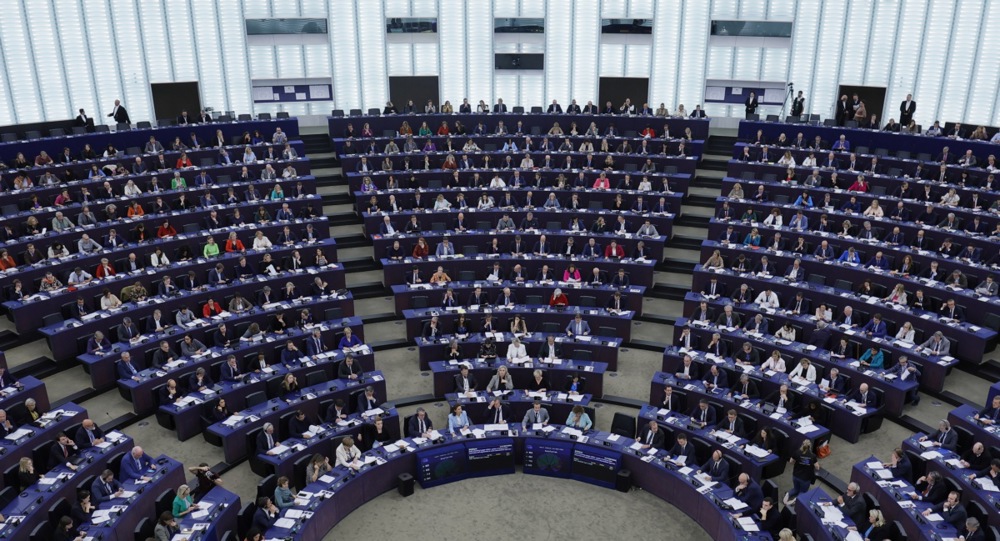When Hungarian Prime Minister Viktor Orbán declared that Hungary should refuse the euro—because the European Union itself is “disintegrating”—he was being anything but unreasonable. He was making an obvious point: It would be economic suicide to bind the fate of Hungary to a monetary union under heavy stress and little to show for itself twenty-five years after its creation. Indeed, the euro has been a catastrophe for weaker, more exposed economies; in the case of Hungary, it would take away all the tools of independent, central bank-led economic recovery, increase asymmetries, and leave the nation at the mercy of policy decisions made in Frankfurt and Brussels with little to no regard for the specific context and needs of smaller member-states.
While his Europhile opponent for next year’s general election, Péter Magyar, is eager to give Brussels the satisfaction of breathing new life into the failed euro project, the Hungarian Prime Minister is wise to call a spade a spade and stand by the national interest. The Maastricht criteria—fiscal discipline, debt limits, price stability, exchange rate stability—are generally sound and prudent requirements. Yet Germany’s fiscal needs are not and will never be Portugal’s, Spain’s or, indeed, Hungary’s. The euro is a one-size-fits-all left-over of the hegemonically globalist mindset of the 1990s. To the majority of its members, the single currency has served as an economic straitjacket, limiting growth and obliterating national competitiveness.
But the technical vulnerabilities are only half the threat. The greater danger is one of structural asymmetry. When small economies join monetary unions dominated by powers of greater stature, they surrender control over managing shocks independently. That is exactly what the euro has meant for Europe. A downturn cannot be reversed by devaluation; a banking crisis cannot be sustained by national injections of liquidity; wage and price competitiveness can no longer be regained through exchange-rate movements. For those unwise enough to join the euro, the currency has meant becoming a hostage to the bigger economies around them.
Empirical evidence increasingly confirms that the euro has been good for Germany, but bad for almost everyone else. According to a famous 2019 study, Berlin has vastly profited from the introduction of the euro. Between 1999 and 2017, the intra-European competitiveness imbalances caused by the introduction of the single currency have led to Germany gaining about €1.9 trillion, a gargantuan sum that is almost equivalent to the entire GDP of Italy. That’s about €23,000 per German citizen.
The consequences have been dramatic for most others, however: For France, the euro has caused a €3.6 trillion fall in prosperity (or €56,000 per Frenchman); in Italy, the currency has caused an even more spectacular burden, with the country losing €4.3 trillion, or as much as €74,000 per capita. Portugal, a country of a scale similar to Hungary (both nations have similarly sized economies and populations), has seen its wealth shrink at a rate of €40,604 per capita. That’s around one and a half years of Portugal’s per capita economic output in nominal terms.
The underperformance of the euro also shows itself in global finance. While the euro is said to be Europe’s answer to dollar dominance, its dreams of replacing the greenback as a global reserve currency have failed completely. In 2009, at its peak, some 28 per cent of global currency reserves were euro-denominated; by 2025, the figure stands at about 19 per cent, even as China’s currency, the renminbi, has seen its share double since 2016. The trend, of course, is likely to continue and accelerate in the years to come as Europe itself suffers the consequences of mass deindustrialisation, relative impoverishment, and debt and political crisis. The euro is a decaying currency. Smart people are getting rid of it, not jumping into the sinking ship.
Orbán’s sober assessment of the overall weakness of the European Union is at the heart of his position. A monetary union groaning under growing political chaos is a precarious foundation upon which to anchor your national economy. If Brussels were to implode, or if Germany, France, or the northern bloc pulled out, Hungary’s exposure would be maximised if it were a member of the eurozone. Why join a club while its walls are falling apart?
Of course, the reason why both Magyar and his Euro-friends really loathe the Hungarian forint isn’t a genuine sense of optimism about the future of the euro. They want to get rid of it because the forint is the bedrock of Hungarian national independence. By having its own currency, Hungary is preserving control over its own economy in a way it wouldn’t if it used the euro. With the forint, Budapest can still largely take on the impositions of the Brussels regime—whether it be on immigration, war, energy, or conservative values, it couldn’t dream of without its own national currency. If Magyar wins the next election, his goal will be to join the euro as soon as he can, therefore seeking to prevent a national-conservative government from ever again returning to power. Hungarians should see through the trick and understand that, in monetary policy as in everything else, no one will ever care as much about your interests as yourself. For the sake of liberty as well as prosperity, the forint should remain Hungary’s currency.





Hungary is right: Ukraine should not join the EU